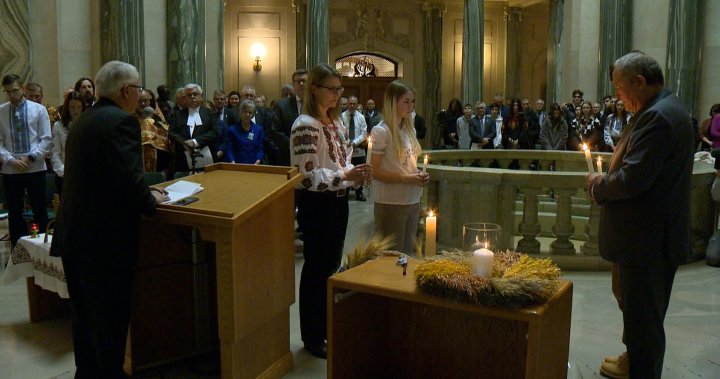
Holodomor Day: Regina commemorates past and present Ukrainian genocide victims
Global News
A special service was held on Tuesday at the Saskatchewan legislative building to commemorate lives lost during the 1932-1933 famine in Ukraine, as well as those affected by war.
A special service was held on Tuesday at the Saskatchewan legislative building to commemorate the lives lost during the famine in Ukraine 90 years ago.
In 1932 and 1933, the Ukraine experienced a man-made famine as a result of poor management of agricultural crop production by the Soviet Union.
Crops were confiscated from farmers and regulations were imposed that prevented people from leaving their communities in search of food. Millions died from starvation. “Holodomor” means “extermination by hunger” in the Ukrainian language and is used to mark the day of remembrance.
“The incomprehensible tragedy of the Holodomor, the Great Famine, took place 90 years ago, but it must not and will not be forgotten,” said MLA Terry Dennis who is responsible for Saskatchewan-Ukraine relations.
“We remember and we join with our fellow citizens of Ukrainian heritage in Saskatchewan to ensure those who suffered and those who perished in those terrible years will be forever in our memory.”
Elena Krueger, president of Ukrainian-Canadian Congress of Saskatchewan said that the current Russian actions are an extension of the oppression of Holodomor.
“We see the actions from 90 years ago repeated, as grain from the bread basket of Europe is once again being kept from those who need it,” said Krueger. “The Russian Federation’s use of food as a weapon threatens the world’s economic stability, contributes to sharp increase in prices and instigates hunger.”
Ukrainian refugee, Anastasiia Vasylieva attended the ceremony and spoke of the current situation in Ukraine with the help of interpreter, Oleh Kovalchuk.











